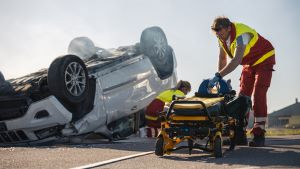 Of the many different types of car accidents, rollovers are among the most dangerous. When a vehicle turns over onto its side or roof, drivers and passengers can be thrown about inside the vehicle, and they can suffer serious bodily harm if the roof or frame of the vehicle is crushed. While wearing a seat belt can significantly reduce the likelihood that a person will be thrown from a vehicle, drivers and passengers can still suffer serious injuries, even if they take all safety precautions. In addition to brain injuries that occur when a person strikes their head on the vehicle’s frame or objects in the vehicle, victims may also suffer spinal cord injuries that could lead to paralysis. If a person’s arms or legs are pinned between the vehicles’ frame or doors and other parts of the vehicle, they could suffer serious bone fractures, nerve damage, or even amputations. Victims of these types of accidents will want to determine who was responsible for their injuries, and with the help of a personal injury lawyer, they can pursue financial compensation for the damages they have suffered.
Of the many different types of car accidents, rollovers are among the most dangerous. When a vehicle turns over onto its side or roof, drivers and passengers can be thrown about inside the vehicle, and they can suffer serious bodily harm if the roof or frame of the vehicle is crushed. While wearing a seat belt can significantly reduce the likelihood that a person will be thrown from a vehicle, drivers and passengers can still suffer serious injuries, even if they take all safety precautions. In addition to brain injuries that occur when a person strikes their head on the vehicle’s frame or objects in the vehicle, victims may also suffer spinal cord injuries that could lead to paralysis. If a person’s arms or legs are pinned between the vehicles’ frame or doors and other parts of the vehicle, they could suffer serious bone fractures, nerve damage, or even amputations. Victims of these types of accidents will want to determine who was responsible for their injuries, and with the help of a personal injury lawyer, they can pursue financial compensation for the damages they have suffered.
Liability for Rollover Crashes
While any type of vehicle can turn over in a collision, rollovers are more likely for top-heavy vehicles such as SUVs, vans, and pickup trucks. In some cases, a car may roll over after colliding with another vehicle, but the majority of rollovers occur in single-vehicle accidents.
Rollovers may occur when a driver loses control of their vehicle, such as when they attempt to make a sharp turn while traveling at a high speed or when they swerve around an obstacle or another vehicle. In most cases, rollovers take place when a vehicle “trips” on an object or road hazard. For example, a car may turn over after skidding into a curb or guardrail, when it strikes a pothole, or when the tires leave the pavement at the side of the road and come into contact with softer soil or gravel on the shoulder.
Driver negligence is often to blame for rollover accidents. If a driver was speeding, intoxicated by alcohol or drugs, or distracted due to talking or texting on a cell phone, this may have caused them to lose control of their vehicle. Rollovers may also be caused by mechanical failures, such as tires that blow out or brakes that lock up. In many cases, injuries will not necessarily be due to the negligence of a driver who causes a rollover, but they may occur because of defects in the automobile itself, such as defective seat backs or head rests, weak roof structures, or defective seatbelts.
Victims of rollover accidents should be sure to understand their options for pursuing compensation from the liable parties. Passengers in a vehicle that rolled over or people in other vehicles may be able to take legal action against a negligent driver, or victims may seek to hold a car’s manufacturer liable for rollovers that occurred because of defective auto parts. These types of cases are often very complex, and extensive investigation is often required to establish liability. To ensure that they can successfully recover compensation, victims will want to work with an attorney who can gather the necessary evidence, such as records related to vehicle safety issues, photographs of the scene of an accident, police reports, 911 call recordings, or testimony from witnesses to the crash.
Contact Our Appleton Rollover Accident Lawyers
A vehicle rollover can result in devastating injuries for a driver and their passengers. The lawyers of Herrling Clark Law Firm, Ltd. can help victims of these types of accidents determine their best options for receiving compensation. If you have been injured in a rollover accident, contact our Green Bay car accident injury attorneys at 920-739-7366 and schedule a complimentary consultation today.
Sources:
https://www.safercar.gov/Vehicle-Shoppers/Rollover/Causes
https://www.consumerreports.org/cro/2012/02/rollover-101/index.htm



